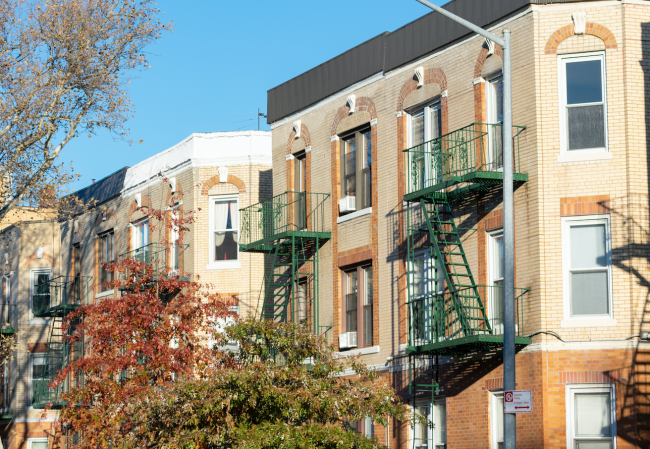I’m afraid of a squatter in my building. Can I break my lease without a penalty?
- Your landlord appears to be violating their responsibility to provide a safe, habitable apartment
- This may be a case of constructive eviction, which requires you to move out and provide evidence

To back up a claim of constructive eviction, you will need to show evidence of why you were forced out.
iStock
A squatter in my building threatens me and other tenants, and yells all day. I’ve complained to the landlord for months but they say they can’t do anything and that I should call the police. But that won’t make me feel any safer. Can I break my lease four months early without penalty?
You should prioritize your safety and move out if you feel you are in danger. Breaking a lease is pretty common for a variety of reasons, including safety, and there’s a right way to do it. While you may end up having to pay some rent or a fee, leaving early may still be the best option for you.
It sounds like you’ve already taken the first essential step: notifying your landlord of the problem (ideally in writing, or however your lease requires) and giving them an opportunity to solve the issue. You should send your landlord evidence of this person’s harassment, and make sure to document other problems in your building—such as broken door locks, a lack of heat, or vermin—by calling 311 or making a complaint online.
[Editor's note: Realty Bites tackles your NYC rental questions. Have a query for our experts? Drop us an email. We respect all requests for anonymity.]
“You’re going to need to have as much proof as you can of what has been going on,” said Catherine Grad, an attorney at Himmelstein, McConnell, Gribben & Joseph.
For immediate help, you can call 988 to request a mobile crisis team if you’re concerned this person is going through a mental health crisis. These teams operate from 8 a.m. to 8 p.m. and are best used for urgent, non-emergency situations. (If someone is at imminent risk of harming themselves or others, the city advises calling 911.)
Try to negotiate an early exit
If your landlord owns multiple properties, you could ask them to relocate you to a different building. Or, you could ask to terminate your lease early because of this squatter’s harassment, however your landlord may ask for a fee to let you out of your obligation.
You could also band together with your fellow tenants to pressure your landlord into removing this person, said Jeffrey McAdams, a tenant attorney at McAdams Law.
“If the squatter is in the building, the landlord has an obligation for the security of the building to evict that squatter,” McAdams said. “That squatter, by definition, almost is a threat to the rest of the building and doesn’t have a right to be there.”
Claiming you were forced out
NYC landlords have a responsibility to provide a safe, habitable apartment under the warranty of habitability—a set of requirements guaranteed in every lease. If your landlord fails to rectify the situation, you may be able to claim you were forced out of your apartment in a constructive eviction.
To back up that claim, you need evidence of why you were forced out, you must actually move out of the apartment, and you have to show that your landlord is somehow at fault, Grad said.
“You have to show that the landlord is allowing this to go on,” Grad said. “If the landlord is told that there’s someone in the building who is presenting a physical threat of harm or is making it impossible for someone else to live there and does nothing about it, I would say that you could raise the claim of constructive eviction.”
If your landlord won’t say what (if anything) they’re doing to solve this problem, check to see if they have started an eviction proceeding through the New York court system’s two search tools: eFiling and ECourts. You’ll need to look up your landlord’s name, the name of their LLC, or the name of the squatter.
You’ll have a stronger argument for constructive eviction if your landlord hasn’t acted, or has dragged their feet, Grad said.
After you’ve moved out, write to your landlord to let them know you left because your building was unsafe and you were constructively evicted. Or better yet, get an attorney to do so—if you can afford one. If not, you can also get in touch with a tenant advocacy group such as the Met Council on Housing or your neighborhood’s tenant’s association (if it exists) for more assistance.
Your landlord must try to re-rent the apartment
Once you’ve left, the landlord has a legal responsibility to mitigate damages—meaning they have to do everything to re-rent the apartment. Keep an eye out on rental sites to see if the apartment was re-rented. If so, your landlord cannot “double dip,” or force you to pay rent while renting the unit to another person, said Steven Kirkpatrick, an attorney at Romer Debbas. (But you could be responsible for the difference between your rent and the new tenant’s rent.)
“There is a statute that requires the landlord to mitigate his damages,” Kirkpatrick said. “The landlord has to make good faith efforts to re-rent the apartment at the current rent or a lower amount if the fair market value is lower. That gives the tenant some protection.”
Still, there are some risks to moving out without a deal with your landlord. They may sue you for the unpaid rent depending on the amount, which could get you put on the tenant blacklist—meaning your name will come up in court data searched by tenant screening firms. While it’s illegal for a landlord to refuse to rent to you because your name appears in housing court data, in practice, the law can be difficult to enforce.
Ultimately, these risks might be well worth it to get out of an unsafe living situation.
“No one should be subjected to these conditions,” Grad said.





























